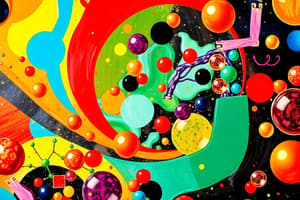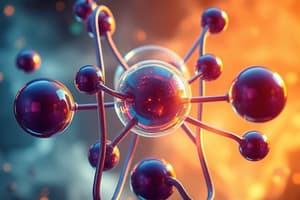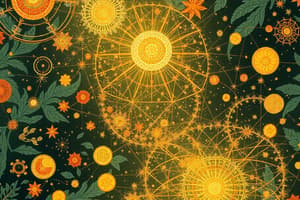Podcast
Questions and Answers
What are compounds made of?
What are compounds made of?
- A mixture of different elements
- A single element in varying ratios
- Atoms with different numbers of protons
- Two or more elements combined in a fixed ratio (correct)
What is the smallest unit that makes up elements and compounds?
What is the smallest unit that makes up elements and compounds?
- Neutrons
- Atoms (correct)
- Protons
- Electrons
How do chemical reactions result in the formation of new compounds?
How do chemical reactions result in the formation of new compounds?
- By altering the number of protons in atoms
- By breaking and forming chemical bonds (correct)
- By converting elements into compounds
- By changing the state of matter
What do all elements have in common?
What do all elements have in common?
How are matter's properties used to identify and classify it?
How are matter's properties used to identify and classify it?
What distinguishes compounds from their constituent elements?
What distinguishes compounds from their constituent elements?
Which part of an atom is responsible for forming chemical bonds?
Which part of an atom is responsible for forming chemical bonds?
How do isotopes of an element differ from each other?
How do isotopes of an element differ from each other?
What is the primary function of chemical reactions?
What is the primary function of chemical reactions?
Why are elements considered the basic building blocks of matter?
Why are elements considered the basic building blocks of matter?
Study Notes
Exploring Matter, Compounds, Atoms, and Elements in Chemistry Class 9tj
Chemistry Class 9tj is all about diving into the fundamental nature of matter and how it interacts. The core concepts we'll explore include:
-
Matter: Everything you can touch, feel, or see is made of matter. Matter exists in various forms, and the properties of these forms make up the basis of chemistry.
-
Compounds: Compounds are substances formed when two or more elements are combined in a fixed ratio. They have unique properties and can be identified by their chemical formulas.
-
Atoms: Atoms are the building blocks of matter. They are the smallest units that make up elements and compounds. Each element has a specific number of protons in its atoms, which determine its identity.
-
Elements: Elements are substances that cannot be broken down into simpler substances by ordinary chemical methods. Atoms that make up elements have the same number of protons in their nucleus.
-
Chemical reactions: Chemical reactions are processes where one or more substances are changed into different substances. These changes involve the breaking and forming of chemical bonds, resulting in the formation of new compounds.
Matter and Its Properties
Matter is all around us, and it comes in many forms. It can be solid, liquid, or gas, and it exhibits various properties that enable us to identify, classify, and use it.
Compounds
Compounds are formed when elements combine in a fixed ratio to create a new type of matter. They possess unique properties that are different from those of their constituent elements, and their behavior in chemical reactions is characteristic of the compound.
Atoms
Atoms are the fundamental building blocks of matter, and they consist of a nucleus containing protons and neutrons surrounded by a cloud of electrons. Atoms of the same element have the same number of protons, but they can differ in the number of neutrons, leading to the formation of isotopes.
Elements
Elements are made of atoms that have a specific number of protons in their nucleus. There are 118 elements, and they are the basic building blocks from which all matter is composed. Some elements are found naturally in their pure form, while others must be isolated from their compounds to be obtained in their pure form.
Chemical Reactions
Chemical reactions are transformations where one or more substances are changed into different substances. These reactions involve the breaking and forming of chemical bonds between atoms. They are fundamental to understanding the world around us and allow us to produce useful materials and energy.
In subsequent lessons, you'll explore chemical reactions in more detail, learning about types of reactions, reaction rates, and energy changes. With this foundation, you'll be well-equipped to dive into the fascinating world of chemistry!
Studying That Suits You
Use AI to generate personalized quizzes and flashcards to suit your learning preferences.
Description
Explore the fundamental concepts of matter, compounds, atoms, elements, and chemical reactions in Chemistry Class 9th. Learn about the properties of matter, the formation and characteristics of compounds, the structure of atoms, the uniqueness of elements, and the transformative nature of chemical reactions.




